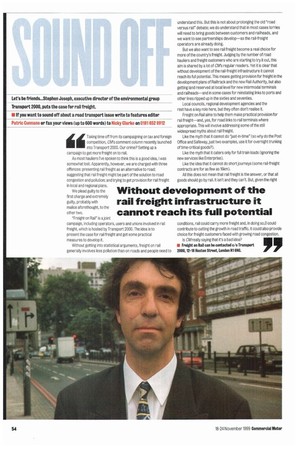Let's be friends...Stephen Joseph, executive director of the environmental group Transport 2000, puts the case for rail freight.
Page 56

If you've noticed an error in this article please click here to report it so we can fix it.
• If you want to sound off about a road transport issue write to features editor Patric Cunnane or fax your views (up to 600 words) to Nicky Clarke on 0181 652 8912
ii CTaking o m pe ttiitmioenoffcmfrosmcoitms mcaemntpcaoiglnumingn orenctaxentalynldaufonrcehiegdn
into Transport 2000. Our crime? Setting up a campaign to get more freight on to rail.
As most hauliers I've spoken to think this is a good idea, I was somewhat lost. Apparently, however, we are charged with three offences: presenting rail freight as an alternative to road; suggesting that rail freight might be part of the solution to road congestion and pollution; and trying to get provision for rail freight in local and regional plans.
We plead guilty to the first charge and extremely guilty, probably with malice aforethought, to the other two.
"Freight on Rail" is a joint campaign, including operators, users and unions involved in rail freight, which is hosted by Transport 2000. The idea is to present the case for rail freight and get some practical measures to develop it.
Without getting into statistical arguments, freight on rail generally involves less pollution than on roads and people need to understand this. But this is not about prolonging the old "road versus rail" debate; we do understand that in most cases lorries will need to bring goods between customers and railheads, and we want to see partnerships develop—as the rail-freight operators are already doing.
But we also want to see rail freight become a real choice for more of the country's freight. Judging by the number of road hauliers and freight customers who are starting to try it out, this aim is shared by a lot of CAlls regular readers. Yet it is clear that without development of the rail-freight infrastructure it cannot reach its full potential. This means getting provision for freight in the development plans of Railtrack and the new Rail Authority, but also getting land reserved at local level for new intermodal terminals and railheads—and in some cases for reinstating links to ports and other lines ripped up in the sixties and seventies, Local councils, regional development agencies and the rest have a key role here, but they often don't realise it.
Freight on Rail aims to help them make practical provision for rail freight—and, yes, for road links to rail terminals where appropriate. This will involve addressing some of the still widespread myths about rail freight.
Like the myth that it cannot do "just-in-time" (so why do the Post Office and Safeway, just two examples, use it for overnight trunking of time-critical goods?).
Like the myth that it caters only for full train loads (ignoring the new services like Enterprise).
Like the idea that it cannot do short journeys (some rail-freight contracts are for as few as lekm).
All this does not mean that rail freight is the answer, or that all goods should go by rail. It isn't and they can't. But, given the right conditions, rail could carry more freight and, in doing so,0 could contribute to cutting the growth in road traffic. It could also provide choice for freight customers faced with growing road congestion. Is CMreally saying that it's a bad idea?
• Freight on Rail can be contacted c/o Transport 2000,12-18 Hoxton Street, London N16116.
















































































































